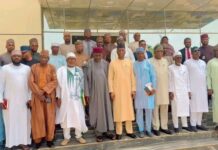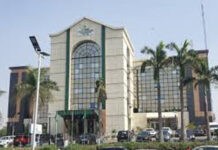The Nigerian Supreme Council for Islamic Affairs (NSCIA), under the leadership of its President-General and Sultan of Sokoto, His Eminence, Alhaji Muhammad Sa’ad
Abubakar, has urged Muslims who could not actualise their hajj plans as a result of Covid-18 pandemic, to consider using part of their refund for charitable causes that are capable of earning them the reward of hajj and even much more.
NSCIA also congratulated Nigerian Muslims on the occasion of the Eid-il-Adha coming up on Friday 10th of Dhul Hijjah, 1441 A.H.
READ MORE: MSSN donates multifunctional contactless COVID-19 machine to Lagos govt
In a statement signed by Prof. Salisu Shehu, Deputy Secretary-General, NSCIA, the Muslim apex body said,
“With Hajj 2020 being suspended for international participants, save for those in the
Kingdom of Saudi Arabia, the NSCIA calls on Nigerian Muslims who had intended Hajj
but could not actualise their intention to consider using part (if not all) of the funds meant
for the pilgrimage for charitable causes that are capable of earning them the reward of
Hajj and much more. For those who are willing to spend on charity but lack the trusted
and assured channel to execute such, the NSCIA has a special agency registered solely
for implementing social and charity projects – Mission for Education, Socials and Health
(MESH). MESH can be contacted via: meshnigeria@gmail.com or telephone number,
08099332299.
“NSCIA congratulates the Nigerian Muslim Ummah and the entire Muslim world on the auspicious occasion of the 1441AH Eid al-Adha celebrations. We pray to Allah to grant us the opportunity to witness many more of it. Amin.
“We pray to Allah to grant us the opportunity to witness many more of it. Amin.
“This year’s Eid is particularly significant as there will be three Khutbahs (sermons)
within the span of two days—the Khutbah of ‘Arafat on Thursday, 9th of Dhul-Hiijah,
1441AH, and the khutbahs of Eid and Jumu’ah on Friday, 10th of Dhul-Hijjah, 1441 AH.
Indeed, these are extraordinary days every Muslim should reflect and maximise the rare
opportunities and virtues they present to invoke the mercy of Allah and His blessings.
“In line with the tradition of the Prophet, Muslims who are not on Hajj are encouraged to
fast on the day of ‘Arafat, the 9th day of the month of Dhul-Hijjah, 1441 AH, equivalent
to Thursday, 30th July, 2020, while praying fervently to Allah for the forgiveness of sins
and healing of the world from all diseases, most especially the destructive Coronavirus.
“Meanwhile, as Eid al-Adha knocks the door, it is crucial to reiterate that we are living in
unusual times where normalcy has become abnormal, including social gatherings and
large congregational prayers.
“Muslims are enjoined to note that Eid al-Adha is not a compulsory religious activity (fard) and at no point should it be observed if doing so will undermine the fundamental purpose of Shari’ah: security, a multifaceted concept which includes personal, communal, national, environmental and health components, among others. This is to say that it is not over until it is over.
“For the purpose of emphasis, the fundamental goal of Shari’ah or ―divine guidance‖,
popularly construed as ―Islamic Law‖, which is a more befitting interpretation of its
component, ―fiqh‖, is security. In Islam, this security operates at five cardinal levels,
otherwise referred to as maqaasidus shari’ah or objectives of Shari’ah. These are the
security of religion, life, intellect, procreation and property.
READ MORE: Pilgrims go into 4-day isolation ahead of journey to Mina
“These objectives of Shari’ah are basic necessities for existence in every human society
and every society is duty-bound to protect them. The steps taken to contain COVID-19,
including restrictions in the observance of our cherished religious activities, are in
furtherance of the letter and spirit of maqaasid shari’ah. Every discerning Muslim is
aware that the prevailing doctrine of necessity due to Coronavirus is not just a Nigerian
issue, it is a global matter of concern.
“As it is not yet over, Muslims should continue to act according to the established protocol
in their various communities and locations in Nigeria during the forthcoming Eid alAdha. In places where restrictions have been lifted from congregational prayers, Muslims
should observe their Eid prayers while still taking necessary safety measures regarding
personal hygiene, facial masks and social distancing. It is even advisable that in such
places, massive gatherings at one Eid ground in a big city should be avoided. Rather the
Eid could be performed in area-Mosques to avoid unmanageable crowds. However, in
places where the ban on public congregational prayers and socio-religious gatherings is
still in force, Muslims are directed to be law-abiding while appreciating that intentions
supersede actions and actions are judged on the basis of intentions, as Prophet
Muhammad (SAW) said (Buhari and Muslim).






















